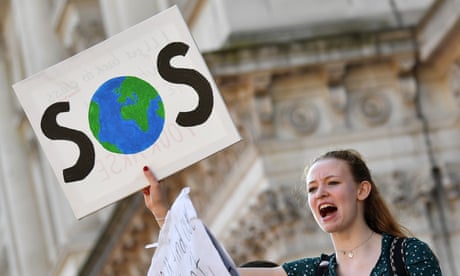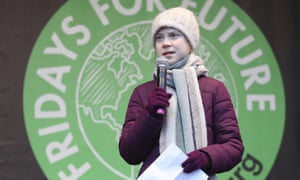Fridays for Future to publish letter urging reform of common agricultural policy ahead of European commission meeting
Fiona Harvey Environment correspondent
Greta Thunberg speaks to participants of Fridays for Future demonstration in Hamburg in February. Photograph: Christian Charisius/AP
The EU’s farming sector needs radical reform, and the common agricultural policy (CAP) must be rewritten if the climate crisis is to be tackled, a group of young climate activists will urge.
Fridays for Future, founded by teenagers in the wake of Greta Thunberg’s school strikes, will confront the European commission’s vice-president, Frans Timmermans, online to call for new plans to cut greenhouse gas emissions from agriculture, and replace subsidies based on the amount of land farmed with payments for farmers supplying public goods, such as clean water, clean air and lower carbon emissions.
“[We] demand a pathway to climate neutrality for the EU’s agricultural and food sector,” the activists wrote in an open letter published ahead of the virtual meeting. “We need to transform direct payments into payments for public goods. Public money needs to flow into the transition to sustainable, climate-friendly and peasant [sic] agriculture. We need a new evidence-based and just CAP.”

Sign up to the Green Light email to get the planet's most important stories
Read more
The CAP is worth close to €60bn a year, and costs roughly €114 annually per citizen. However, the system has been blamed for the increase in intensive farming, overuse of pesticides and poor attention to soil conservation and wildlife protection.
Earlier this week, the EU published its biodiversity strategy, which would devote €20bn a year to boosting wildlife, and require the planting of 3bn trees in the next decade, but stopped short of the sweeping reform of the CAP that campaigners want.
“Current agropolicy is an immediate threat to our future,” Tilman von Samson, one of the activists, told the Guardian. “Not only because the CAP is inactive in reducing emissions – much worse, it is gambling away the potential for hope that lies in agriculture [which] can be a climate buffer.”
Reform to subsidies could reward farmers for conserving carbon in their soil and vegetation, which would benefit nature as well as helping the EU to reach net zero emissions by 2050. The EU’s farm to fork strategy would cut pesticide use, boost organic farming and halve the use of antibiotics on farm animals by 2030, as well as improving farming practices to reduce carbon dioxide emissions.
Fridays for Future wants the EU to go further as part of its European Green Deal, the centrepiece of the bloc’s strategy which is meant to steer Europe to net zero emissions by 2050. The European commission is trying to push the policy ahead of crunch climate talks, called Cop26, postponed to next year from their original date of this November in Glasgow.
Ursula von der Leyen, president of the commission, hailed the green deal plan as Europe’s equivalent of the US putting a man on the moon in the last century, a transformative proposal that would reach into every aspect of people’s lives, from energy and transport to food and nature.
But von Samson told the Guardian: “Everything that has been discussed yet is incompatible with the Paris Agreement, and the future into which the current CAP proposals will lead us are as far from one another as the man on the moon and his home planet. We want to remind the commission of their responsibility. If they want to make a real change, they have to start with a new CAP.”
The EU’s farming sector needs radical reform, and the common agricultural policy (CAP) must be rewritten if the climate crisis is to be tackled, a group of young climate activists will urge.
Fridays for Future, founded by teenagers in the wake of Greta Thunberg’s school strikes, will confront the European commission’s vice-president, Frans Timmermans, online to call for new plans to cut greenhouse gas emissions from agriculture, and replace subsidies based on the amount of land farmed with payments for farmers supplying public goods, such as clean water, clean air and lower carbon emissions.
“[We] demand a pathway to climate neutrality for the EU’s agricultural and food sector,” the activists wrote in an open letter published ahead of the virtual meeting. “We need to transform direct payments into payments for public goods. Public money needs to flow into the transition to sustainable, climate-friendly and peasant [sic] agriculture. We need a new evidence-based and just CAP.”

Sign up to the Green Light email to get the planet's most important stories
Read more
The CAP is worth close to €60bn a year, and costs roughly €114 annually per citizen. However, the system has been blamed for the increase in intensive farming, overuse of pesticides and poor attention to soil conservation and wildlife protection.
Earlier this week, the EU published its biodiversity strategy, which would devote €20bn a year to boosting wildlife, and require the planting of 3bn trees in the next decade, but stopped short of the sweeping reform of the CAP that campaigners want.
“Current agropolicy is an immediate threat to our future,” Tilman von Samson, one of the activists, told the Guardian. “Not only because the CAP is inactive in reducing emissions – much worse, it is gambling away the potential for hope that lies in agriculture [which] can be a climate buffer.”
Reform to subsidies could reward farmers for conserving carbon in their soil and vegetation, which would benefit nature as well as helping the EU to reach net zero emissions by 2050. The EU’s farm to fork strategy would cut pesticide use, boost organic farming and halve the use of antibiotics on farm animals by 2030, as well as improving farming practices to reduce carbon dioxide emissions.
Fridays for Future wants the EU to go further as part of its European Green Deal, the centrepiece of the bloc’s strategy which is meant to steer Europe to net zero emissions by 2050. The European commission is trying to push the policy ahead of crunch climate talks, called Cop26, postponed to next year from their original date of this November in Glasgow.
Ursula von der Leyen, president of the commission, hailed the green deal plan as Europe’s equivalent of the US putting a man on the moon in the last century, a transformative proposal that would reach into every aspect of people’s lives, from energy and transport to food and nature.
But von Samson told the Guardian: “Everything that has been discussed yet is incompatible with the Paris Agreement, and the future into which the current CAP proposals will lead us are as far from one another as the man on the moon and his home planet. We want to remind the commission of their responsibility. If they want to make a real change, they have to start with a new CAP.”

No comments:
Post a Comment